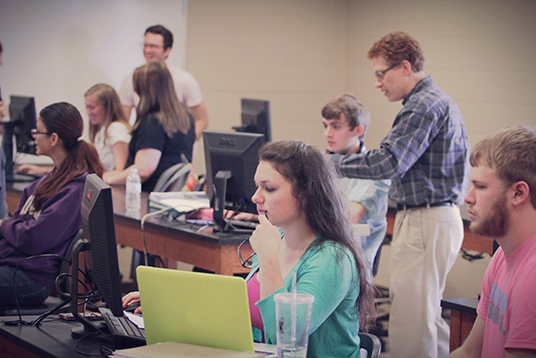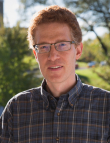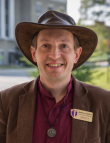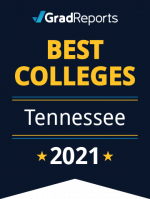Overview
"The opportunity to explore personal projects or get involved in faculty work at Trevecca is second to none. I was given autonomy and responsibility that no other school would give."
Trevecca physics students benefit from one-on-one interaction with faculty inside and outside the classroom, a nurturing Christian environment and broad liberal arts curriculum. We offer an academically rigorous curriculum that can be tailored to fit your calling.
Within the physics and applied physics majors, students work closely with faculty on research and engineering design projects. Coupled with a rigorous classroom experience in a broad range of science and mathematics classes, this hands-on interaction gives our students unique opportunities for developing expertise in a broad range of engineering disciplines.
Earning your degree in a strong Christian community means you’ll be grow your education and worldview, without sacrificing your beliefs and values. Our small class sizes allow you to focus on different research, projects or assignments on a deeper level.
The physics faculty have obtained corporate and government funding which supports an active undergraduate research program at Trevecca. More details about our Near Space Research program and our Magnetic Imaging research can be found at the physics website. Hands-on experience gained at Trevecca has allowed our students to excel in summer research and continue their education at highly-competitive graduate and medical schools.
Concentrations in the Major
- Physics
- Pre-Engineering
What our students say
"The ability to be completely involved in projects like the double pendulum--from conception, to fabrication, to analysis--was pretty amazing. I was never doing throwaway work at Trevecca. The professors really put the work in the students' hands ... The trust the faculty place in their students is exceptional. From projects like diode laser spectrometry to the nuclear magnetic resonance machine, I always felt like I was given a meaningful role in research."
Faculty
News
Core Classes
General Chemistry I
CHE 1040
The first course in a one-year sequence for students planning further work in chemistry. Topics discussed include atomic structure, periodic relationships, bonding, molecular structure, chemical reactions, thermochemistry, solids, liquids, and gases. Lecture and lab. Fee charged.
Course Hours: 4
General Chemistry II
CHE 1050
The second course in a one-year sequence for students planning further work in chemistry. Topics discussed include solutions, kinetics, equilibrium, acids and bases, thermodynamics, and electrochemistry. Lecture and lab. Fee charged.
Course Hours: 4
Object-Oriented Design and Programming in Java I
PHY 2100
An IT core course designed to provide an in-depth, hands-on introduction to designing and developing software using the Java programming language. Design methodologies, object modeling with UML, structured programming, and data structures are also reviewed. Extensive lab time will help to develop skills needed when developing software.
Course Hours: 3
Seminar in Physics
PHY 4335
Consists of projects and paper presented and reported to the science faculty and science majors.
Course Hours: 1
Circuits
PHY 3130
Elements of AC/DC circuits with semiconductor devices as applied to computing and other systems. Lecture and lab. Fee charged.
Course Hours: 4
Digital Electronics
PHY 2030
A study of the elements and applications of digital logic. Topics include logic fundamentals, minimization techniques, arithmetic circuits, combinatorial circuits, flip-flops, registers and finite state machines. Designs are developed using a Hardware Description Language (Verilog HDL or VHDL) and implemented in hardware on an FPGA. Lecture and lab. Fee charged.
Course Hours: 4
Statics
PHY 2130
The elements of statics with application to systems of forces in two and three dimensions (particles and rigid bodies), resultants, equivalent systems, and equilibria. Vector notation is introduced. Friction. Lecture and Lab. Fee charged.
Course Hours: 3
Science Philosophy and Practice
SCI 1050
An introduction to the methods used in the practice of science and the philosophies and standards that guide the scientific community as it seeks to advance the understanding of the natural world. Topics will include the process of science, scientific ethics, analysis and presentation of the results of scientific studies, reading and writing peer-reviewed scientific papers, and careers in science. Lecture.
Course Hours: 1
Introduction to Computer Technology for the Sciences
SCI 2150
A hands-on introduction to computer-based measurements, automation, and graphical programming for the sciences. The LabVIEW graphical programming environment will be introduced and used to write software applications that collect, display and analyze experimental data. Automated experiments in the areas of biology, chemistry and physics will be designed and implemented. Topics such as sensors, signals, data acquisition, error analysis, and noise will be explored. The use of standard office spreadsheet, word-processing, and presentation software for scientific data analysis and reporting will also be emphasized. Lecture and Lab. Fee charged.
Course Hours: 3
Calculus I
MAT 1510
A study of Cartesian and polar coordinates, parametric equations, vectors and vector-valued functions in 2 and 3 dimensions, limits, differentiation of functions with applications, integration of functions with applications, Taylor polynomials, and series. It is strongly recommended that students take PHY 2110 and PHY 2120 concurrently with MAT 1510 and MAT 1520, respectively.
Course Hours: 4
Calculus II
MAT 1520
A study of Cartesian and polar coordinates, parametric equations, vectors and vector-valued functions in 2 and 3 dimensions, limits, differentiation of functions with applications, integration of functions with applications, Taylor polynomials, and series. It is strongly recommended that students take PHY 2110 and PHY 2120 concurrently with MAT 1510 and MAT 1520, respectively.
Course Hours: 4
Calculus III
MAT 2510
A study of partial derivatives and multiple integrals and additional topics in vector-valued functions.
Course Hours: 4
Differential Equations
MAT 3020
An introduction to ordinary differential equations, including linear and nonlinear equations with applications, power series solutions, and Laplace transforms.
Course Hours: 3
Overview
"The opportunity to explore personal projects or get involved in faculty work at Trevecca is second to none. I was given autonomy and responsibility that no other school would give."
Trevecca physics students benefit from one-on-one interaction with faculty inside and outside the classroom, a nurturing Christian environment and broad liberal arts curriculum. We offer an academically rigorous curriculum that can be tailored to fit your calling.
Within the physics and applied physics majors, students work closely with faculty on research and engineering design projects. Coupled with a rigorous classroom experience in a broad range of science and mathematics classes, this hands-on interaction gives our students unique opportunities for developing expertise in a broad range of engineering disciplines.
Earning your degree in a strong Christian community means you’ll be grow your education and worldview, without sacrificing your beliefs and values. Our small class sizes allow you to focus on different research, projects or assignments on a deeper level.
The physics faculty have obtained corporate and government funding which supports an active undergraduate research program at Trevecca. More details about our Near Space Research program and our Magnetic Imaging research can be found at the physics website. Hands-on experience gained at Trevecca has allowed our students to excel in summer research and continue their education at highly-competitive graduate and medical schools.
Concentrations in the Major
- Physics
- Pre-Engineering
What our students say
"The ability to be completely involved in projects like the double pendulum--from conception, to fabrication, to analysis--was pretty amazing. I was never doing throwaway work at Trevecca. The professors really put the work in the students' hands ... The trust the faculty place in their students is exceptional. From projects like diode laser spectrometry to the nuclear magnetic resonance machine, I always felt like I was given a meaningful role in research."



